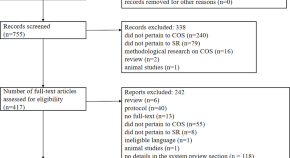The methodological quality of systematic reviews regarding the Core Outcome Set (COS) development
Authors (first, second and last of 15)

Collection
Dr. Wynne E. Norton is a Program Director in Implementation Science (Division of Cancer Control and Population Sciences) at the National Cancer Institute. Her scientific and programmatic interests include de-implementation of ineffective practices, pragmatic trials of implementation strategies, optimization of cancer care delivery, and methodological issues in implementation science. She received a Ph.D. in social psychology from the University of Connecticut. She was a Fellow in the Implementation Research Institute and in the Mixed Methods Research Training Program. She serves on the Editorial Board of the journal Implementation Science.
Dr. Fares Alahdab is an expert in the field of research methodology, cardiology, cardiovascular imaging, as well as biomedical informatics. His research interests include research methods, evidence synthesis and guideline development, machine learning, neural networks, decision analysis, meta-epidemiology, and bibliometric research. He currently serves as research faculty at Houston Methodist Academic Institute and Weill Cornell Medical College.
